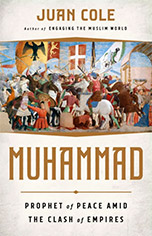Despite the negative messaging nowadays about the Qur’an (the scripture of the Muslims) among the haters, it is a book replete with love, mercy, warmth and peace (to the extent that Muslims are bewildered by the odd opinions of it among outsiders–most of whom have never read it). My new book, out October 9, explores the theme of peace in early Islam.

Muhammad: Prophet of Peace amid the Clash of Empires, coming out October 9
Available for pre-order at Barnes and Noble
And Nicola’s Books in Ann Arbor
And Hachette
And Amazon
In this series of postings I will explore some of the other values, including love.
Qur’an, Chapter of Mary 19:96
“On those who believe and perform good works, the All-Merciful will bestow love.”
This verse occurs toward the end of a chapter that tells the story of Mary, the mother of Jesus. The great scholar of the Qur’an, Muhammad ibn Jarir Tabari (d. 923), glossed this verse as not just about Muslims. He said that “those who believe” are those who believe in God’s envoys. That is, those who believe in Moses, or Jesus, or Muhammad (or, I would argue, large numbers of other religious teachers, since the Qur’an says God has sent them to every nation or people).
Other commenters said that “love” means “love among the people in this world.” That is, the verse is practical, about everyday life (- Yahya b. Talha via Ibn `Abbas).
Another observed, “He loves them, and they love His creation” (- Ibn Hamid via Mujahid).
Another said, “No servants of God advanced toward Him with their hearts save that God sent the hearts of the believers toward them, so that He can provide to them their love and mercy.” (- Haram b. Hayyan).
There are lots of comments quoted by Tabari, and some read the verse more narrowly and communally, but the broadminded and universal interpretations are also prominent.
The verse reminds me of a passage by Paul in the New Testament, which also speaks of faith and love:
1 Corinthians 16:13-14:
13 Keep alert, stand firm in your faith, be courageous, be strong. 14 Let all that you do be done in love.
Γρηγορεῖτε, στήκετε ἐν τῇ πίστει, ἀνδρίζεσθε, κραταιοῦσθε. πάντα ὑμῶν ἐν ἀγάπῃ γινέσθω
Incidentally, the Qur’an’s sentiments in this verse are supported by the findings of Positive Psychology. Spirituality as well as doing good deeds for other people are strongly associated with well-being and happiness, and happy people are more likely to spread love.



 © 2024 All Rights Reserved
© 2024 All Rights Reserved